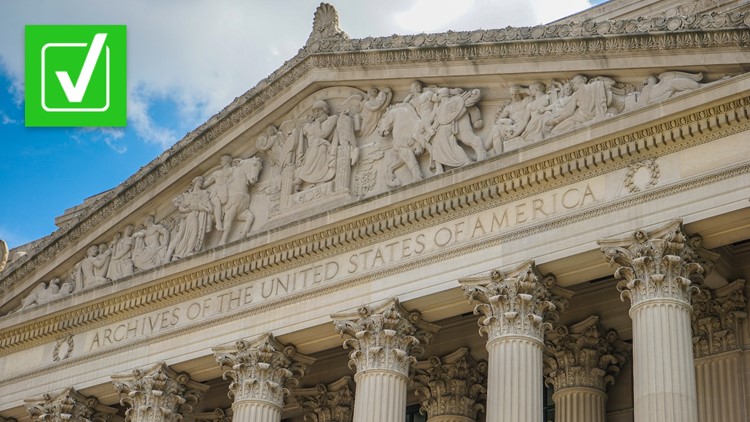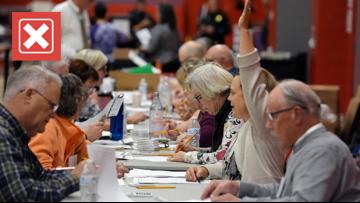In the past year, hundreds of classified presidential records have been found in the homes of President Joe Biden, former President Donald Trump and Trump's vice president, Mike Pence, prompting government investigations into the matter.
On June 9, an indictment revealed that Trump has been charged with 37 counts related to his mishandling of classified information.
Many people on social media claim that presidents must turn over all presidential records when they leave office. VERIFY viewer Chris recently sent an email to our team asking who is responsible for gathering and storing presidential records once a president’s term in office ends.
THE QUESTION
Are presidents required to turn over presidential records when they leave office?
THE SOURCES
- National Archives
- President Records Act of 1978
- Congressional Research Service
- Article by David S. Ferriero, the former archivist of the United States
THE ANSWER
Yes, presidents are legally required to turn over presidential records when they leave office.
WHAT WE FOUND
Presidents are required by law to turn over presidential records when they leave office. The Presidential Records Act of 1978 (PRA) states that any records created or received by a president while in office are the property of the U.S. government and will be managed by the National Archives and Records Administration (NARA) at the end of their term.
The PRA defines presidential records as documentary materials created or received by the president or his staff in the course of their official duties in office. The law excludes personal records, such as diaries, journals or other personal notes “of a purely private or nonpublic character,” as well as federal records, according to the Congressional Research Service.
The Watergate scandal prompted the passage of the PRA. After President Richard Nixon resigned in 1974, he wanted to destroy certain presidential records, including the White House tapes, but Congress passed a law to seize them and place them in the National Archives instead, according to a 2017 article written by David S. Ferriero, the former archivist of the United States.
“Four years later, Congress passed the Presidential Records Act of 1978, which established government ownership of presidential records, starting with the next President to take office (Reagan),” Ferriero said.
During a president’s term in office, their staff is solely responsible for maintaining all of their presidential records. But NARA routinely provides records management guidance to the incumbent administration upon request. It also provides courtesy storage for certain presidential records, historical materials and gifts given to the president.
Several months before the end of the president’s term, NARA staff work with the president’s staff to provide for the transfer of hundreds of millions of textual, electronic, and audiovisual records and gifts. It is NARA’s responsibility to ensure that there is an orderly process in place to move all records and gifts remaining in the White House to the National Archives for shipment to a temporary facility when the administration ends.
“On January 20, at the end of the president’s final term, the presidential records of the administration are automatically transferred to the legal custody of the Archivist of the United States and the National Archives and Records Administration,” NARA explains on its website.
After taking legal custody of the presidential records, the documents are eventually moved from the temporary facility and housed in a presidential library that is maintained by NARA, which “preserves, reviews, arranges, describes, and makes available these records in its role as legal custodian.”
Five years after a president leaves office, presidential records are eligible for access under the Freedom of Information Act (FOIA), which gives any person the right to request access to records of the executive branch of the U.S. government, including classified material. On Feb. 10, NARA announced that it has made its first FOIA release of documents related to the transfer of Obama-era presidential records from President Biden to the National Archives.
In January, the National Archives asked former U.S. presidents and vice presidents to recheck their personal records for any classified documents following news of the Biden and Pence discoveries.
After classified documents were found at his Indiana home in January, Pence said that he was unaware the documents had been in his possession.
“Let me be clear: Those classified documents should not have been in my personal residence,” Pence said on Jan. 27 at Florida International University. “Mistakes were made, and I take full responsibility.”
Biden also recently said during a Feb. 8 interview that he was surprised to learn about the presence of classified documents found at his old office at a Washington-based think tank and his Delaware home.
“I'll just let the investigation, you know, decide what's going on and we'll see what happens,” Biden said.
Former officials from various levels of government occasionally discover they are in possession of classified materials and turn them over to the authorities at least several times a year, the Associated Press reports. It’s been a problem off and on for decades, from presidents to Cabinet members and staff across multiple administrations stretching as far back as Jimmy Carter.
VERIFY reached out to NARA for comment but they did not provide a response.
The Associated Press contributed to this report.













